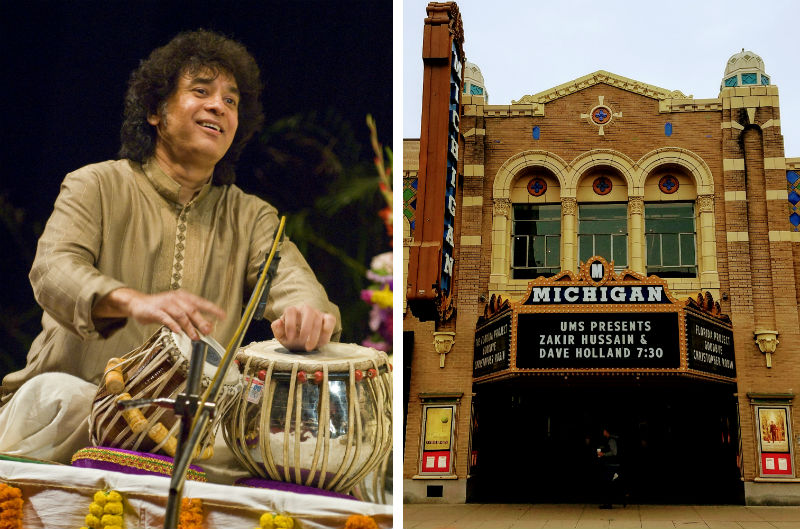Common Language: Zakir Hussain's Crosscurrents at Michigan Theater

Tabla virtuoso Zakir Hussain mixes Indian music and jazz in his band Crosscurrents. And he doesn't mind if you call it the "f" word.
"First, let’s address the word 'fusion,'" he said in an interview before Crosscurrents' Wednesday, Nov. 1., concert at the Michigan Theater, courtesy of UMS. "Fusion is not new. It is just a word needed by people to call music whereas that music speaks one unified language. The media is conscious of it now. Ravi Shankar and George Harrison ("Norwegian Wood") contributed to making musical interactions mainstream. Fusion is not unusual. Now, it’s just more visible, advertised, and focused."
The sold-out concert in jam-packed downtown Ann Arbor witnessed what Hussain called the "universal voice of interaction," where "there are neither borders nor language issues. ... In 'hybrid' forms of music, a meeting is inevitable because the structure of Indian classical and jazz music, for example, is improvisation."
Both musical styles are underlined by the sound of surprise, which fits how Hussain approaches his life.
I kept these words in mind as I took a seat in the theater. From conversations I overheard around me, some audience members were familiar mostly with Hussain’s career and unfamiliar with the careers of jazz bassist Dave Holland or the rest of the band. Conversely, some audience members were mostly familiar with Holland's storied career -- including a legendary stint with Miles Davis and a 30-year association with the influential ECM Records -- but not the career of Hussain. The audience was soon to discover what the seven-member ensemble together had in store.

The lights dimmed and a yearning sound from Chris Potter’s saxophone opened up the evening’s set. Potter explored the instrument's entire range and the high notes he reached from unending exhalations were superhuman. The audience erupted in applause, which made it difficult to hear his subsequent solo. This active appreciation happened frequently throughout the night, and the band ravenously fed off this energy.
Holland was up next for a solo. As he plucked at his bass, the music enveloped Holland and he physically rocked out with his entire body, which was dressed in a sky blue kurta with light embroidery. ("He must have a good tailor," Hussain joked after he introduced Holland as “the maestro, the master.")
What followed was sheer ecstasy: Hussain, Holland, and his longtime-jazz-quartet bandmate Potter in a trio that had the audience entranced. Their drums, bass, and saxophone were in perfect sync conversing with one another. Hussain would play a solo on the tabla, Holland would imitate the tune with his bass, and Potter would do the same with his saxophone.
Vocalist Shankar Mahadevan was the centerpiece for "Rama Rama," a traditional South Indian Carnatic piece in kriti format, and he seemed to hit otherworldly notes in endless octaves in both high and low directions. And drummer Gino Banks was given a chance to shine on "Doors." He, too, fed off the energy of the enraptured audience, and began drumming even faster and more vigorously during his solo. Banks was in such a trance himself, playing his drums with such passion and energy, that he knocked his seat right out from behind him.
“We are very democratic,” Hussain said with a smile about his group's generous solo spotlights while introducing a turn from the South Indian kriti form toward a North Indian semi-classical form, thumri. “This is not the Zakir Hussain comedy hour,” he said, to the audience’s laughter. (The band also included guitarist Sanjay Divecha and keyboardist Louiz Banks.)
As the evening winded down, the music picked up and Crosscurrents launched into the familiar song “Eena Meena Deeka,” which Hussain announced as the track that popularized American jazz music in Bollywood. It’s a fun, upbeat tune with a plucky bass line that had the audience dancing in our seats.
Amusingly, the folk song “Laal Meri Pat," which venerates a Sufi saint from Sindh in modern-day Pakistan, has been covered at each of the last three performances I have reviewed, including Crosscurrents. Mahadevan sang it with relish as well as enthusiasm to the audience’s appreciation. His vocals crescendoed on “Encounter (Breathless),” so named because of the infrequent breaths taken in continuously sung verses.
Meanwhile, I imagine the furiously fast Hussain must have had a hard time catching his breath as he pounded the tabla. He must be part-octopus to be able to play so many beats in a bar -- one cannot possibly be capable with of doing so with only two hands.
Overwhelmed with audience applause, Crosscurrents returned for an encore and Mahadevan dedicated the song “Ma” to “all the mothers out there,” in acknowledging the universality of experiencing love for a mother: “Tujhe sab hai pata, hai na, ma?" ("You are knowledgeable of everything, isn’t that right, mother?")
During the concert, Hussain referenced the conversation we had earlier in the day, repeating a short historical introduction emphasizing that this “fusion genre” isn’t one so clinical and rigid, produced in a laboratory and defined as such. It was a reminder that while musical genres such as “fusion” serve as a categorizing function, the labels are mostly arbitrary. Crosscurrents spoke one mesmerizing, unified language: music.
Setlist:
"Shadows"
"Dove"
"Hope" (trio: Hussain/Holland/Potter; composed by Potter)
"Rama Rama" (traditional Carnatic classical piece, featuring Mahadevan)
"Doors" (featuring Gino Banks' drum solo)
"Radha Rani"
"Ena Meena"
"Finding the Light" (duet: Hussain/Holland; composed by Holland)
Tabla solo (featuring Zakir Hussain)
"Encounter (Breathless)" (featuring Mahadevan)
--------
Encore:
"Ma" (featuring Mahadevan)
Sairah Husain is a desk clerk at the Ann Arbor District Library. She enjoys creative writing, tennis, and playing the sitar. When she is not doing these things, she can be found picking up her holds at AADL that she may or may not read, in which case she provides them a cozy four-week home.


































